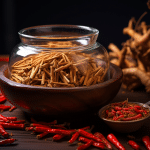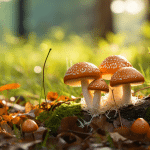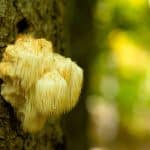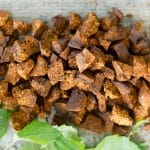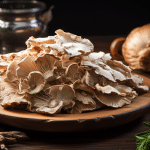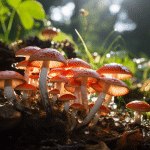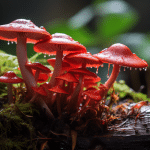Can You Take Lion’s Mane Mushroom While Breastfeeding?
The short answer is yes, you can take lion’s mane mushrooms while breastfeeding.
Mushrooms are an excellent source of Vitamin D and other nutrients, making them a generally healthier food to consume when breastfeeding. Since difference sources make difference claims about the safety of taking lion’s mane while pregnant, you can always consult with your doctor. Although the reason why other sources claim that it may not be safe to take while breastfeeding is due to lack of studies. But if you think about lion’s mane as simply any other food that you consume, it’s no more dangerous than an apple or a banana.
So again, lion’s mane is safe to consume while breastfeeding, but consult with your doctor if you have any hesitation. And you can always decide to wait to supplement lion’s mane until after you’re done breastfeeding if it makes you feel better.
Are Other Mushrooms Good to Eat When Breastfeeding?
It is vital that you keep up a healthy diet while breastfeeding, because the foods that you eat are responsible for the nutrients that you give your baby. In addition, excessive eating of the wrong foods may cause an increase of harmful toxins in the bloodstream, which may be passed on to the baby.
It may be a good idea to start eating mushrooms when breastfeeding, due to the Vitamin D they contain. It is important to keep up your vitamin D intake when breastfeeding because it helps to regulate the calcium levels in the body.
When breastfeeding, your body may draw calcium out of your bones in order to supply adequate amounts to the baby. If your body is lacking in vitamin D and calcium, your bones may get weak and fragile. Not providing these to a child via breastmilk could also lead to problems with bone development.
Mushrooms are also a good source of beta-glucans. Beta-glucans have multiple functions in the body, mostly used to lower cholesterol levels and to support the immune system. However, there is also some evidence to suggest it may increase prolactin levels in the body as well.
Other Foods That Are Great to Eat While Breastfeeding
You do not have to follow a particular diet when breastfeeding, but eating a variety of healthy foods is important so that you have access to a broad array of nutrients that will support you and your baby.
1. Avocado
Avocados are an excellent source of B vitamins, vitamin K, vitamin C, vitamin E, folate, and potassium. They are also packed with healthy fats, providing a feeling of fullness, as well as providing calories that are packed with nutrients that satisfy the appetite.
2. Asparagus
Asparagus can raise the prolactin levels of your body, acting like an estrogen. This effect is not completely understood, but has been found to stimulate the mammary glands in animal studies.
3. Nuts
Apart from the B vitamins and vitamin K, most nuts contain high amounts of iron, calcium, and zinc. They are also an excellent source of fatty acids and protein. Nuts are also commonly thought to boost milk production.
However, very little research has been done on foods that can increase milk production, and this specific claim has not been proven.
What Foods Should You Stay Away From When Breastfeeding?
Just like eating a healthy diet supports your health during breastfeeding, eating too much of the wrong foods can have negative effects on you or the baby.
1. Caffeine
The caffeine that you consumed could make its way into your breast milk. It is hard for the developing digestive system of your infant to digest, and subsequently, a lot of caffeine may accumulate in their system. This may make it harder for them to sleep, or make them more irritable. It is recommended that you do not consume more than 2 to 3 cups of coffee a day, and avoid energy drinks entirely, because they are filled with added sugars and unhealthy chemicals.
2. Alcohol
Alcohol ends up in your breast milk, too. Having an occasional drink is okay, but avoid breastfeeding at least 2 hours after drinking, which is approximately the time it takes one unit of alcohol to leave your system. Large amounts of alcohol take longer to clear your system. Heavy drinking may reduce your milk supply and have negative effects on your baby’s development if he or she gets alcohol from your breastmilk.
3. Processed Foods
Processed foods are loaded with calories, added sugars, and unhealthy fats, yet are low in nutritional value. As a result, they satisfy your appetite but do not give you the nutrients needed to sustain you and the baby.
In addition, multiple animal studies show that the mothers diet during breastfeeding greatly influences her children’s diet preferences when they are growing up. Studies have suggested a similar bias exists in humans, although further studies are needed. If so, eating a healthier diet during lactation may result in a more nourishing diet for the baby later on, whereas eating lots of unhealthy foods may have the opposite effect.
4. Strongly Flavored Foods
Some foods are not bad for you or your baby, at least not in moderate amounts, but can contribute to other problems with breastfeeding. Strong flavors, such as onions, garlic, and spices, may make baby reluctant to feed, or be fussy after feeding. These foods may affect breastmilk flavor, and some babies are more sensitive than others. If you are inclined to sweat while eating a spicy meal, this may affect your baby’s willingness to latch on as well.
Functional Mushrooms Can Be Part of a Health Diet When Breastfeeding
While there are some foods that you should not overeat while breastfeeding, mushrooms are not one of them. They are high in Vitamin D and other nutrients that support both your health and the health of the baby. There is no need to think about your diet when breastfeeding; however, try to maintain a healthy regular diet and avoid giving into temptations for unhealthy foods too frequently.
Additional Resources:
Can You Take Lion’s Mane Mushroom at Night?
Does Lion’s Mane Help With Dementia?
Updated 10/5/2022







